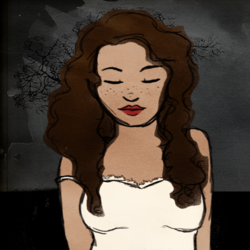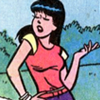Sign In
Closethe grandmother's tale by redridinghood
Her head hums with restlessness; she wonders if he can feel it, buzzing into his shoulder where she leans against it. The flesh beneath his rough woolen shirt is warm, and she instinctively keeps herself pressed as close to it as possible. It is cold out here in the woods, while they wait, and a crimson cape is not enough to keep her warm.
“Tell me again,” she says, voice drowsy but grey eyes bright.
“Tell you what?” he asks without looking at her; his gaze goes out into the trees, looking for any sign of those for whom they wait.
“Anything.”
“Well,” he says, and draws her closer yet, strong arms wrapped around her, his mouth next to her ear, and begins his story.
Once upon a time (he says, and she smiles at the familiar beginning) there was a girl, a beautiful girl. She had eyes like candlesmoke, and she lived in a village with her mother and father, and a ways outside of the village lived her grandmother, in a cottage all her own. The grandmother knitted her granddaughter a beautiful chaperon of crimson wool, and gave it to her. The girl never took it off but by force, and from then on she was called le petit chaperon rouge.
One day her mother said, “Take this hot loaf and a bottle of milk to your mameta, who is sick,” and the girl took the bread and milk in her basket and set off. She came to a crossroads on the forest path, and there she met a bzou. But she didn’t know he was a bzou, you see—for he was very handsome (she giggles), and they were blinded by the other’s beauty.
“Where are you going?” he asked her, and she replied:
“I’m taking a hot loaf of bread and a bottle of milk to my mameta.”
“Which path are you taking,” asked the bzou, “the path of needles, or the path of pins?”
The girl took scarce a minute to think; she would take the path she always had, and so she smiled at him and tightened the string on her chaperon and said, “The path of needles.”
The bzou smiled at her, and it was a hungry smile. Littler girls would be scared. But she only smiled back at him, and he said, “Well then, I’ll to the path of pins.”
So they separated, and the girl dawdled on the road, amusing herself picking up needles. They were very sharp, but she had no fear; she gathered them into her little cloak, and went on. But the bzou meanwhile arrived at her grandmother’s. She had left the door unlatched in her illness, you see, so it was easy for him to go inside and kill her. He put some of her flesh in the pantry, and a bottle of blood on the shelf—
But then those for whom the pair wait arrive, and the story breaks off; she steps out from under his arms and their shadows take the shapes of wolves, darting silently over the ground.
It is not until much later, when the sun is almost risen, that they are alone again, and walking to their shared cottage (now that she has left her village, and he never had one to begin with). His arm is around her, drawing her close, keeping her warm; her tangled curls are dirty and her cheek is streaked with something red.
She looks up at him as they cross the threshold into the house, and says, “Finish the story.”
The girl arrived at the house, and rapped at the door (he says as they close their own behind them); the bzou said, “Push the door, it’s closed with a wet straw.”
So the girl came inside, and she chirped at the figure in its bed, “Hello, mameta; I’m bringing you a hot loaf and a bottle of milk.”
“Put them in the pantry—and eat the meat that’s there, and drink the bottle of wine on the shelf; we won’t tell your mother. A special treat, for you.”
She smiled, and took down the meat and wine, and sat at the table to eat. As she ate, a little cat said: “She is a slut who eats the flesh and drinks the blood of her granny!” (A frown deepens the corners of her lips; he hastens on with the story:)
“Undress, my child,” said the bzou, “and come to bed beside me.” (She smiles again.)
“Where should I put my apron?”
“Throw it on the fire, child; you won’t be needing it anymore.”
And she asked where to put her other garments: the bodice, the dress, the skirt, the stockings (he tugs away her clothes as he tells this part; she laughs, but lets him go on, both with his words and with his hands). Each time, the bzou’s answer is the same: “Throw them on the fire, child; you won’t be needing them anymore.”
She crawled into the bed (as she does, now, taking over the girl’s dialogue in words that she has known forever): “Oh, Granny, how hairy you are!” (A wicked smile from the both of them.)
“It’s to keep me warmer, child.”
“Oh, Granny, what long nails you have!” (A whisper as he cups her chin in his hand, smirking.)
“To scratch me better, child.”
“Oh, Granny, what big ears you have!”
(She kisses his, and he says:) “All the better to hear with, child.”
“Oh, Granny, what a big mouth—“
But his mouth silences hers, and the story is not finished; their next words are silent ones, in the language of wanting. His mouth slides down her bare skin and she gasps something that might have been a prayer or might have been a curse. The sharp screams that come from the cottage that early morning are of devouring, but not the kind in his story.
The red chaperon lies forgotten on the cold ashes of last night’s fire.
The characters in this story are Rojeta and Emeric, a pair of Occitan werewolves whose story is very dear to my heart, if not wholly fleshed-out.
Written September 2011.
"the grandmother's tale" © Chloe Sevario
Submission Information
- Views:
- 139
- Comments:
- 0
- Favorites:
- 0
- Rating:
- General
- Category:
- Literary / Story


